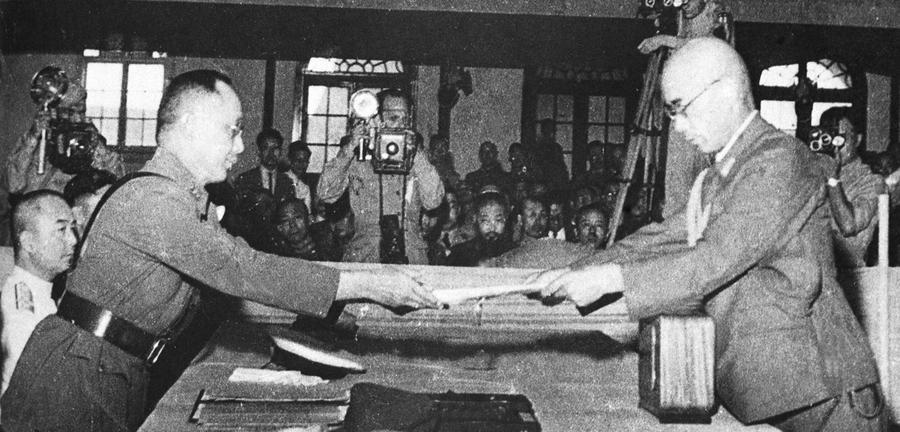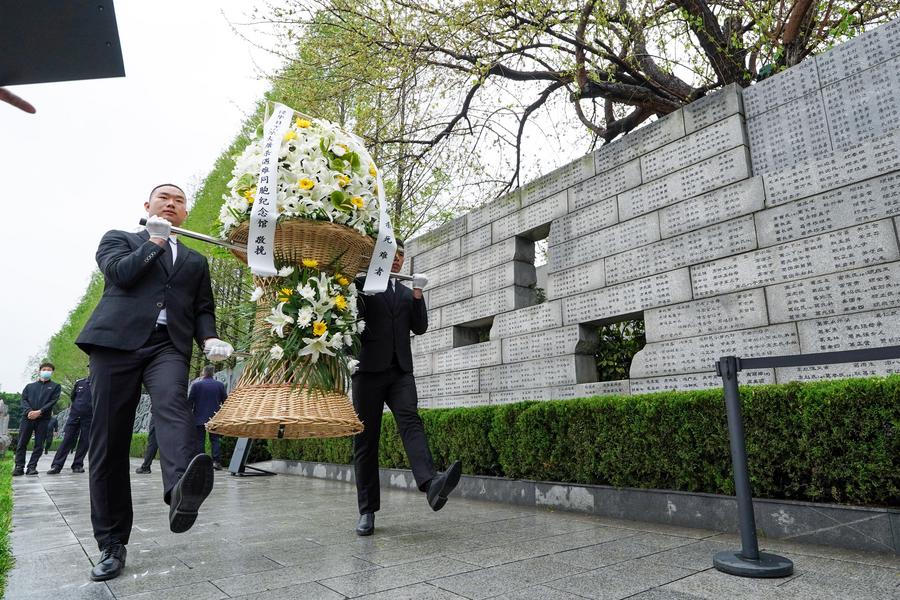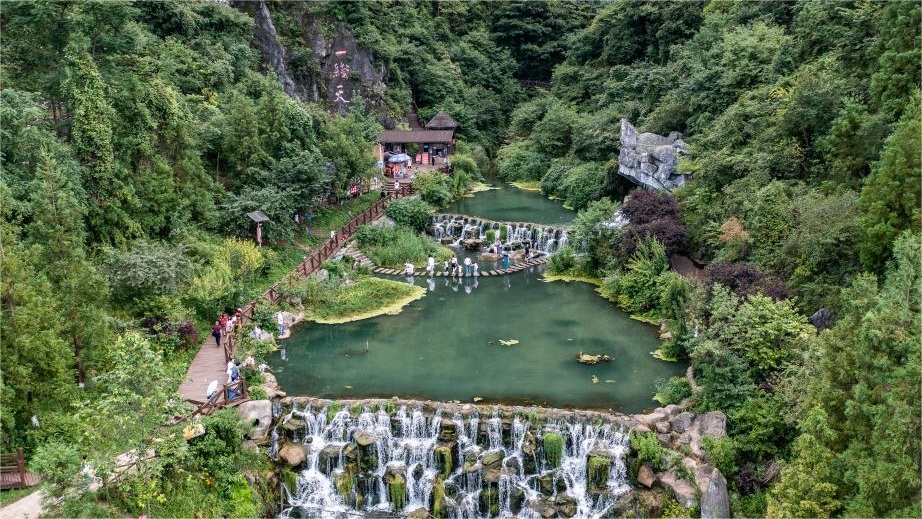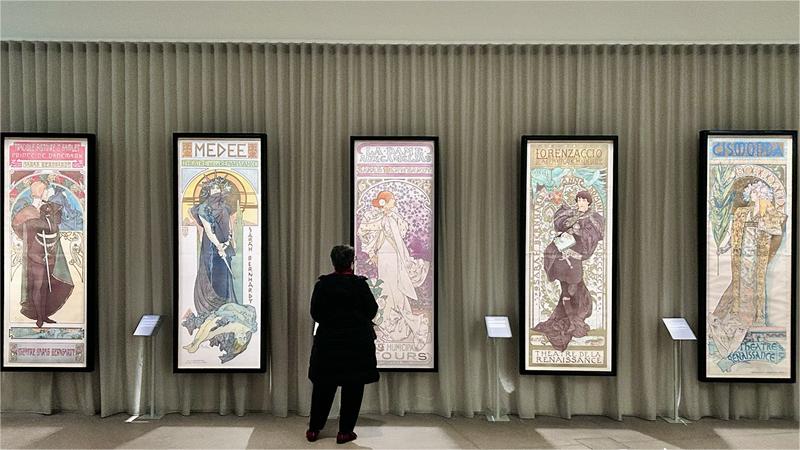Japan's anniversary of WWII surrender draws concern

File photo taken on Sept. 9, 1945 shows He Yingqin (L), representative of the Chinese government, receiving the surrender of Japan in Nanjing, east China. On Aug. 15, 1945, Japanese Emperor Hirohito delivered a recorded radio address to the nation, announcing the surrender of Japan in World War II, one day after Japan declared its acceptance of the provisions of the Potsdam Proclamation jointly issued by China, the United States and Britain on July 26, 1945, with the Soviet Union joining later. (Xinhua)
The rise of right-wing forces in the country has led to an unsettling trend: persistent efforts to re-establish Japan as a military power, coupled with attempts to whitewash its aggressive past and undermine its post-war pacifist Constitution.
TOKYO, Aug. 15 (Xinhua) -- As the world observes the 79th anniversary of Japan's unconditional surrender in World War II, the Asian nation's recent troubling moves have raised concerns within the international community.
Japan, a nation that was expected to remember its history and cherish peace in the post-war era, has taken an unexpected turn. The rise of right-wing forces in the country has led to an unsettling trend: persistent efforts to re-establish Japan as a military power, coupled with attempts to whitewash its aggressive past and undermine its post-war pacifist Constitution.

This picture taken on July 7, 2023 shows photos revealing details of the Japanese invasion of China. A new batch of evidence revealing more details of the Japanese invasion of China has been collected from Japan, the Exhibition Hall of Evidence of Crime Committed by Unit 731 of the Japanese Imperial Army in Harbin announced. (The Exhibition Hall of Evidence of Crime Committed by Unit 731 of the Japanese Imperial Army/Handout via Xinhua)
DISTORTED HISTORICAL PERSPECTIVES
Every year, on Aug. 15 and other significant dates, a group of right-wing Japanese politicians would openly visit the controversial Yasukuni Shrine, a symbol of Japanese militarism and its wartime aggression and home to 14 Class-A Japanese war criminals from WWII.
Such visits, strongly condemned by peace advocates within Japan and the international community, have repeatedly strained Japan's relations with its neighboring countries.
This year, concerns have intensified following reports of large-scale visits to the shrine by members of Japan's Self-Defense Forces (SDF). Notably, Hiroki Kobayashi, the Ground SDF's deputy chief of staff, led dozens of SDF members in a collective visit to the shrine in January.
It was later revealed that Rear Admiral Yasushige Konno, the commander of the Maritime SDF (MSDF) Training Squadron at the time, led 165 graduates of the MSDF Officer Candidate School on a visit to the shrine last May. Photos of this visit were subsequently featured in an article published in Yasukuni Shrine's newsletter.
Such visits by officials violated Japan's constitutional principle of the separation of religion and state and an administrative vice minister directive issued in 1974 prohibiting a group visit by SDF members to a religious facility.
However, in response to mounting criticism, the Ground SDF stated that the visit was a personal act conducted during a break and only issued a minor punishment for using an official vehicle.
Similarly, former MSDF Chief of Staff Adm. Ryo Sakai dismissed the incident as a "personal visit" and indicated that there would be no investigation.
Analysts warned that the SDF's involvement in visits to the Yasukuni Shrine and the leadership's apparent leniency suggest that the twisted view of history symbolized by these visits has deeply infiltrated Japan's armed forces.
In an even more disturbing case, the MSDF has confirmed that a group of its personnel visited the war-memorial Yushukan museum within the shrine's compound as part of their training program in May, Japanese newspaper Asahi Shimbun reported Wednesday.
Moreover, retired MSDF Adm. Umio Otsuka was announced as the 14th chief priest of the Yasukuni Shrine in April, marking the first time a former SDF officer has taken this role. During WWII, the position was held by retired Army General Takao Suzuki, a "coincidence" that many find troubling.

Staff members present a flower basket to victims of the Nanjing Massacre at the Memorial Hall of the Victims in Nanjing Massacre by Japanese Invaders, in Nanjing, east China's Jiangsu Province, April 3, 2024. (Xinhua/Li Bo)
WHITEWASHING HISTORICAL ATROCITIES
Also, in April, Japan's Ministry of Education approved a junior high school history textbook by Reiwa Publishing that promotes the imperial historical perspective, which denies the forced recruitment of "comfort women" by the Japanese military.
This was the first time such a textbook has passed government review, raising the possibility that the controversial book could be introduced in schools as early as next year.
In 1993, then Chief Cabinet Secretary Yohei Kono issued the Kono Statement, acknowledging the Japanese military's direct involvement in setting up "comfort stations" and forcibly recruiting women in Korea, China, and elsewhere, offering an apology and reflection on these actions.
However, the newly approved textbook contradicted the stance, asserting that comfort women were "paid workers" and that "the Japanese military did not forcibly take Korean women."
The Japanese government has long tolerated historical revisionism, attempting to reshape public historical understanding through textbooks that whitewash Japan's colonial rule and aggressive wars, said Toshio Suzuki, a representative of the citizens group Nationwide Network for Children and Textbooks 21.
This misleads children about Japan's past, fostering xenophobic sentiments against China and South Korea, he said.
Tamaki Matsuoka is a Japanese activist who has spent decades interviewing survivors and victimizers of the 1937 Nanjing Massacre to reveal the historical truth about the country's war crimes to the Japanese people.
She told Xinhua that the WWII-related part of Japanese elementary school history textbooks devotes more than a dozen pages to the atomic bombings of Hiroshima and Nagasaki and the air raid on Tokyo. There is almost no description of Japan's crimes of aggression, let alone the Nanjing Massacre.
Under the guise of creating a "beautiful country" proposed by former Japanese Prime Minister Shinzo Abe, Japan has repeatedly tried to whitewash the stains of its history of aggression. To this day, Japanese teenagers know little about war responsibility, and memories of the war crimes are rapidly fading.
VEERING FROM PACIFIST CONSTITUTION
In recent years, Japan has used the Korean Peninsula and Taiwan Strait, as well as the Ukraine crisis, as an excuse to hype up tensions and create panic in the region.
By describing China as "an unprecedented and largest strategic challenge," Japan has taken the opportunity to significantly adjust its security policy, steadily bolster its defense budget and continuously relax restrictions on arms exports, repeatedly breaking the restraints of its pacifist Constitution.
Japan's "exclusively defense-oriented policy" is increasingly challenged by the government's breaking of several military taboos. Despite widespread opposition, Prime Minister Fumio Kishida's government in 2022 approved revisions to three security and defense-related documents, including the National Security Strategy, to acquire "enemy base strike capabilities."
The government also plans to allot about 43 trillion yen (384 billion U.S. dollars) to defense outlays from fiscal 2023 through 2027, nearly 1.6 times the amount over the previous five-year period.
In March this year, Japan approved a plan to sell next-generation fighter jets that it's developing with Britain and Italy to other countries and further revised the Three Principles on Transfer of Defense Equipment and Technology and their implementation guidelines, throwing open the door for direct exports of lethal weapons to other countries in another violation of the country's postwar pacifist principles.
Since 2022, Japan has signed reciprocal access agreements with Australia, Britain and the Philippines, forming a "quasi-alliance" relationship. Japan has also strengthened its collusion with NATO, attempting to "invite the wolf into the house." During Kishida's visit to the United States in April this year, the two sides raised their defense ties to unprecedented levels.
These contentious moves by Japan violate its exclusively defense-oriented policy and pacifism embodied in its Constitution and pose security threats to East Asia.
Ukeru Magosaki, a former Japanese foreign ministry official, said that disputes between Japan and its Asian neighbors could be resolved diplomatically; however, the Japanese government has blindly catered to the demands of the United States and gone down a dangerous path of military buildup.
It is time for Japan to genuinely consider what kind of policy can bring it security.
Photos
Related Stories
- Japan ministers visit notorious war-linked Yasukuni Shrine despite opposition
- S. Korea expresses regret over Japanese leaders' offering, visit to war-linked shrine
- Radioactive water leaks reported at Japan's crippled Fukushima power plant
- Japan PM Kishida to step down, not running for ruling LDP president
- Former member of Japanese germ-warfare unit exposes war crimes in China
Copyright © 2024 People's Daily Online. All Rights Reserved.









